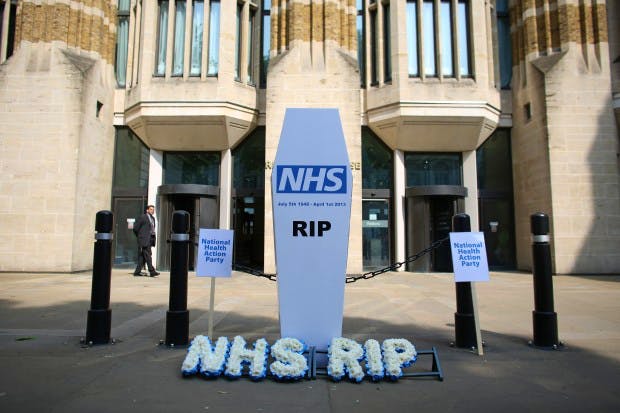The philosophy of the National Health Service, as stated on its website, is that ‘good healthcare should be available to all, regardless of wealth’. This is why, in theory, Britain’s health service ‘covers everything’. Not this month. Last night, NHS hospitals were made to cancel all non-emergency surgeries until February in order to divert resources to this year’s flu epidemic, which is causing mass overcrowding. As a result, outpatient clinics will be shut down for weeks, and 50,000 appointments have been cut from the schedule.
50,000. Even in today’s world, where statistics are everywhere that number cannot pass by fleetingly. 50,000 patients, often in pain as they wait for a hip replacement, knee surgery, or cataract surgery are being denied treatment because the NHS is ill-equipped to deal with the winter flu. If this is not the definition of system failure, what is?
Thanks to the monopoly status of the NHS, most of those 50,000 will simply have to wait until the system can accommodate them. There is no competitor to the NHS; no cheap alternative for quick access to a doctor. Unless you are wealthy, you are at the mercy of bureaucrats, who do not remotely deserve our trust. This is the same lot that tried to paint crackdowns on free sunscreen prescriptions and athletes foot medication as revolutionary reform. We all know, deep down, that hard truths are being buried to protect this sacred cow. But if doctors are now speaking out about ‘third world conditions’ of the NHS, surely it’s time for politicians and commentators followed suit.
The NHS does indeed rank in the bottom third of international comparisons of health system performance. It grades far below the social health insurance systems of Europe, and other systems further abroad, which consistently outperform the UK on crucial aspects of healthcare, such as A&E waiting times and cancer treatment. From Switzerland to Singapore, these systems offer universal access to healthcare – and they aren’t toppled over by flu outbreaks.
Both the left and the right need to get their heads out of the sand and start learning lessons from these superior systems. From the left, we get lazy accusations that the NHS is underfunded. While some countries with better health outcomes spend a higher percentage of their GDP on healthcare (like Germany and France), other countries, like Australia and Iceland, are spending roughly equal or less and also delivering better results. The funding debate is a secondary issue; it is the failures of a strict single-payer system – which breeds inefficiency, limits patient choice, and is proving incapable of dealing with demographic shifts – that must be addressed.
Meanwhile, the right must stop placing the blame at the feet of immigrants, whose contributions to the NHS are helping to prop it up more than anything else. There are legitimate grievances to be had about a service paid for through taxation being used by those who haven’t contributed. But the cost of those deliberately trying to take advantage of the system is tiny, compared to the daily waste and inefficiencies of the NHS. (The cost of healthcare tourists is estimated to range between £110m and £280m a year; the cost of missed GP appointments alone is £1bn).
Deficient resources are not linked to what services immigrants use and immigrants don’t use, but rather which sectors are state-run and which are not. The NHS, run by the state, has fallen far behind the rest of the world, and its patients have fallen with it. How much worse will it have to get before reform can be discussed publicly, without ridicule? The winter flu may come around every year, but it does not have to be accompanied with a winter crisis.
Kate Andrews is news editor at the Institute of Economic Affairs







Comments